|
|
|
Sort Order |
|
|
|
Items / Page
|
|
|
|
|
|
|
| Srl | Item |
| 1 |
ID:
124057


|
|
|
|
|
| Publication |
2012.
|
| Summary/Abstract |
In a series of 1990s simulations, the LCS concept was born; the Strait of Hormuz was the hypothetical scenario, and 'the fight against sea and shore' became the mantra.
|
|
|
|
|
|
|
|
|
|
|
|
|
|
|
|
| 2 |
ID:
145738
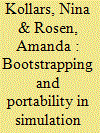

|
|
|
|
|
| Summary/Abstract |
Despite the existence of a large literature on the use and effectiveness of simulations as part of the active learning pedagogical toolbox, simulations have yet to achieve wide adoption rates among college instructors. One of the principal constraints is time: traditionally, most simulations require extensive time for the faculty to design, prepare, and use in the classroom setting. This article examines two design features of simulations aimed at solving this problem—portability, where simulations are designed as a framework that can be used for different subjects, classes, and disciplines; and bootstrapping, or the tying of the simulation content to commonly known fictional or pop-culture scenarios. Combined, these two features can reduce some of the barriers to simulation use in the classroom. We conclude by illustrating both principles with a sample simulation called “The Trial of Goldilocks.”
|
|
|
|
|
|
|
|
|
|
|
|
|
|
|
|
| 3 |
ID:
084677
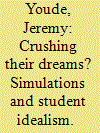

|
|
|
|
|
| Publication |
2008.
|
| Summary/Abstract |
In-class simulations can offer students an excellent opportunity to apply the lessons they have learned in a practical and fun manner. The literature on active learning in international relations demonstrates the many values simulations possess. In running a simulation on the conflict in Darfur, I identified an additional potential value in in-class simulations: they can be a technique for tempering student idealism. Students often fail to appreciate the disconnect between their personal political convictions and the political realities that impede conflict resolution. Simulations allow students to apply theory to practice in a way that encourages students to temper their idealism by acknowledging political realities on the ground. I discuss how a week-long simulation on Darfur encouraged students to balance idealism and realism and understand why reaching agreements in the international community can be so difficult.
|
|
|
|
|
|
|
|
|
|
|
|
|
|
|
|
| 4 |
ID:
090656
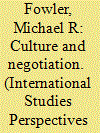

|
|
|
|
|
| Publication |
2009.
|
| Summary/Abstract |
This article examines one especially challenging aspect of active-learning international studies courses-the use of cross-cultural simulations. What is the significance of culture for negotiation? What difficulties might cross-cultural negotiations pose, and how might negotiators work with cultural differences to achieve successful outcomes? Is it possible to model the effects of cultures on negotiators in a classroom role-play? What are the advantages to using cross-cultural simulations, and what difficulties do they entail? How might an instructor make best use of materials that focus on cultural issues and their effect on negotiation? When teaching students of different cultures by active-learning methods, what ought an instructor to bear in mind? What cross-cultural simulations are available, and what readings might be assigned to accompany them?
|
|
|
|
|
|
|
|
|
|
|
|
|
|
|
|
| 5 |
ID:
117731
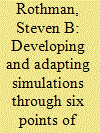

|
|
|
|
|
| Publication |
2012.
|
| Summary/Abstract |
The essay describes a new way to evaluate variation among simulations through six distinct categories. The six points involve the content of the simulation, the integration of the simulation with other aspects of the course, the length of a simulation, the strictness of rules, the interaction among students during the simulation, and assessment techniques. The essay assesses the benefits and costs of the simulation and course design through student feedback and instructor evaluation. In addition, the essay uses these six points of variation as a framework to explain a sample simulation integrated with course objectives, goals, lecture material, two short research essays, and other class activities designed to teach game theory applied to current international problems. The simulation uses current world issues to help students incorporate class content, game theoretic modeling, and strategic interaction into an international negotiation conducted in class.
|
|
|
|
|
|
|
|
|
|
|
|
|
|
|
|
| 6 |
ID:
100368
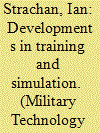

|
|
|
| 7 |
ID:
066281
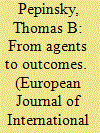

|
|
|
| 8 |
ID:
170408
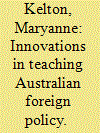

|
|
|
|
|
| Summary/Abstract |
More than ever as the uncertainties of a digitalised world are upon us and where power shifts to and within the region disrupt the familiar patterns of engagement, the acquisition of the knowledge and competencies necessary for Australia to be a trusted international partner are pressing matters. So too, in the development of both personal and professional skills, our pedagogic remit to students guides us to assist them in learning more about themselves in the process. How, then, should we teach Australian foreign policy and in doing so grow the conjunctive tissue of student self-learning in order to prepare students for the world of diplomacy necessitated by Australia's international workspace? Here, experiential learning can have a powerful effect in the teaching of Australian foreign policy and in the development of students' life and professional skills. Both in-person simulations situated within the context of a thoughtful curriculum, and short-term international mobility study tours can contribute to an effective mix of learning experiences and assist us in moving closer toward effective practice in the current uncertainties and an era of digital transformation.
|
|
|
|
|
|
|
|
|
|
|
|
|
|
|
|
| 9 |
ID:
092392


|
|
|
|
|
| Publication |
2009.
|
| Summary/Abstract |
This article reflects some experiences in teaching International Relations (IR) by using films to supplement the use of simulations and role play scenarios. The authors have used simulations and role play scenarios in order to teach complex issues and theories, and to engage the interest of students. By using films to supplement the use of simulations in classrooms, it is suggested that students become more active in their own learning. A number of ways in which simulations and role play can be used in teaching are established here alongside an array of films that can be shown to students to complement such teaching approaches. The use of films to teach IR theory is also listed. It is concluded that the use of simulations, role play, and films in teaching IR can aid student learning especially in terms of IR theory.
|
|
|
|
|
|
|
|
|
|
|
|
|
|
|
|
| 10 |
ID:
090947


|
|
|
|
|
| Publication |
2009.
|
| Summary/Abstract |
Movies have a long and distinguished history in the political science and international relations classrooms; they provide connections between abstract theories and concepts and concrete everyday practices. However, traditional approaches to teaching movies in the political science and international relations classrooms allow for passive student learning, where students watch the movie and then react. We propose using insights from simulations to help resolve these problems with using movies in the classroom. In this article, we outline the learning methods and approaches of simulations, and then apply them to movies in the international relations classroom.
|
|
|
|
|
|
|
|
|
|
|
|
|
|
|
|
| 11 |
ID:
111131


|
|
|
|
|
| Publication |
2012.
|
| Summary/Abstract |
In nuclear nonproliferation negotiations, many governments pursue multiple objectives, and changes in policy can occur rapidly-and often unexpectedly. For these reasons, understanding nonproliferation requires empathy and imagination rather than just historical fact. This article considers one teaching tool to encourage such insight-simulations-and demonstrates how teaching and scholarship can interact to improve our understanding of the complex decisions and negotiations involved in nuclear nonproliferation. The article consists of five parts: first, it explains the benefits of simulations as both a policy development tool in Washington and as a teaching tool in universities; second, it describes the pedagogical strategy of the Stanford University simulation program; third, it shows how the simulations have identified and highlighted theoretical and substantive insights that are often neglected in scholarly studies of nonproliferation; and fourth, it describes how students are tested to enhance the learning experience from the simulation. Fifth and finally, the article provides concluding observations about how using simulations in the classroom can help scholars develop insights that improve their understanding of real-world nuclear negotiation dynamics and outcomes.
|
|
|
|
|
|
|
|
|
|
|
|
|
|
|
|
| 12 |
ID:
064810
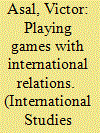

|
|
|
| 13 |
ID:
120821


|
|
|
|
|
| Publication |
2013.
|
| Summary/Abstract |
Classroom simulations are a well-known tool in learner-centered education, and in the field of international relations, simulations have been utilized for years to stimulate student learning. The literature has shown that simulations encourage active learning and retention of information; however, there are challenges with conducting simulations online, and the tool has been relatively underdeveloped. While there are commercial online simulations, there has been less research on the effectiveness of various approaches, particularly in classes that are completely online, with simulations entirely designed and implemented by faculty. This paper reviews some of the literature on simulations, hybrid and online, creates a design framework from the literature and analyzes a simulation implemented in an online mixed graduate/undergraduate regional studies political science class. Results showed positive learning and feedback from the students; however, several features will be changed in the simulation design to improve future simulations. Further, suggestions will be offered on how this type of simulation can be tailored for different courses.
|
|
|
|
|
|
|
|
|
|
|
|
|
|
|
|
| 14 |
ID:
092565
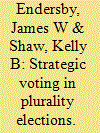

|
|
|
|
|
| Publication |
2009.
|
| Summary/Abstract |
Experiments designed as an election simulation involve participants in an investigation of strategic voting. Participants assigned political preferences and informed of candidate/party positions on an ideological dimension respond to and learn the results of two public opinion polls before voting. When given two alternatives, the participants vote sincerely. Confronted with three or more alternatives, participants make tactical decisions to narrow the field. Strategic behavior quickly reduces the number of alternatives to two. Consistent with Duverger's law, candidate/party viability encourages strategic voting and the development of a two-party system. The election simulation serves as a useful tool to teach about electoral behavior and to explore topics such as strategic voting.
|
|
|
|
|
|
|
|
|
|
|
|
|
|
|
|
| 15 |
ID:
098444
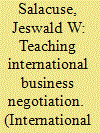

|
|
|
|
|
| Publication |
2010.
|
| Summary/Abstract |
The author has taught international business negotiation in a wide variety of university courses and executive training programs throughout the world during the last three decades. He has taught international business negotiation both as an end in itself and as a means to teach law, an approach that he calls "the law in the shadow of negotiation." This article examines three fundamental dimensions of that experience: pedagogical goals, course content and teaching methods. His principal pedagogical goals in international business negotiation courses have been three-fold: better negotiation analysis, improved negotiation skills, and increased international business knowledge. Depending on the time available, the content of his international business negotiation courses covers three broad areas: the fundamentals of conflict analysis and the negotiation process, basic themes in international negotiation, such as the importance of negotiation, preparation and the management of internal negotiations, and the special obstacles faced in international business negotiation, such as cultural differences among the parties, the actual or potential role of governments in the negotiation process, and challenges to the stability of negotiated agreements. The author's teaching relies heavily on experiential methods and materials, such as exercises, simulations and cases, although more didactic methods also have a role.
|
|
|
|
|
|
|
|
|
|
|
|
|
|
|
|
| 16 |
ID:
095642


|
|
|
|
|
| Publication |
2010.
|
| Summary/Abstract |
Instead of always teaching students how to succeed-as is the norm in higher education-it might also be useful to teach them about failure. Understanding failure (that is, why actors fail to reach common objectives in inter-group settings) gives students deeper insight into how to resolve global problems, and the conditions under which success can be achieved. This enhances student awareness of complexity in world affairs, including the nature of inter-group relations. Simulations are a good way to teach students about the possibility of failure, and how to learn from it, because they allow students to go through the learning process on their own. In this article I discuss how a simulation I ran on Middle Eastern politics can be used as an example of how to instruct students about failure as much as about success.
|
|
|
|
|
|
|
|
|
|
|
|
|
|
|
|
| 17 |
ID:
019200


|
|
|
|
|
| Publication |
Nov-Dec 2000.
|
| Description |
17-24
|
|
|
|
|
|
|
|
|
|
|
|
|
|
|
|
| 18 |
ID:
119406


|
|
|
|
|
| Publication |
2013.
|
| Summary/Abstract |
Interest in zombies is booming across campuses. International Relations (IR) scholars have likewise begun to pay attention to the undead, as the zombie invasion scenario-envisioned in a variety of movies, television shows, and books-brings to bear many of the key issues and controversies of international relations theory. Here I provide some concrete suggestions for incorporating zombies into undergraduate classes. Drawing from a leading book in this genre (World War Z), I sketch out some of the ways that the zombie wars can be applied to key issues taught in introductory-level IR classes. I then provide specific suggestions to incorporating these insights into the classroom, including discussion guides and simple role-playing exercises.
|
|
|
|
|
|
|
|
|
|
|
|
|
|
|
|
|
|
|
|
|